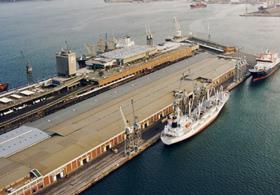
Inefficiencies at the port of Durban have been a thorn in the side of the South African citrus industry, which experienced another problematic and frustrating year at the port’s container terminal from which a huge proportion of the citrus crop is shipped.
Last season saw the wheels came off at Durban’s container terminal (DCT), but it was nothing compared to what was experienced this year.
“Industrial action, equipment failure and poor planning, amongst others, led to very poor productivity,” says the CGA’s Mitchell Brooke. “The wheels fell off the bus last year, but this year not only did the wheels fall off, but the bus overturned.”
According to Brooke, this resulted in truck congestion at the terminal gates and vessel delays, causing disruptions to schedules.
“To give an example of how bad the productivity is at DCT, one must compare our experience there from those gathered during a recent visit to Algeciras port in Spain,” he said. “In Spain, a typical vessel handling 6,000 TEU takes roughly 36 hours to complete. DCT is taking up to five days to do the same, if we consider the experience we had with the Maersk Safari service, Durban’s biggest carrier.”
Brooke said that a number of vessels avoided Durban this year and dropped containers at Ngqura Container Terminal (NCT) near Port Elizabeth. This led to problems at NCT as the terminal became overrun with reefer transshipments. These containers had to be rerouted back to Durban on feeder vessels.
“Due to the high reefer occupancy at NCT, the terminal had to manage by crisis and prohibit acceptance of reefers on short notice,” he explained. “The main issue here is not only the severity of the disruptions to the landside logistics, but more so the disruption to the vessel schedules. This meant that citrus consignments by and large missed the weekly deliveries to receivers, who again used this as leverage to penalise exporters and reduce the price agreements.”
Brooke said that throughout the supply chain producers ended up footing the bill, with the main culprit, port parastatal Transnet, experiencing no consequences.
According to Brooke, the South Africa’s finance minister recently stated that South Africa’s recovery from the recent recession was largely due to agricultural exports, of which citrus is a main contributor.
“In this lies a clear message to Transnet that its number one priority must be to support the fruit industry,” said Brooke. “This season saw a record 122m cartons of citrus. We soon expect to export more than 130m cartons. We simply cannot have the ports being a barrier to trade in this way when the stakes are so high.”



